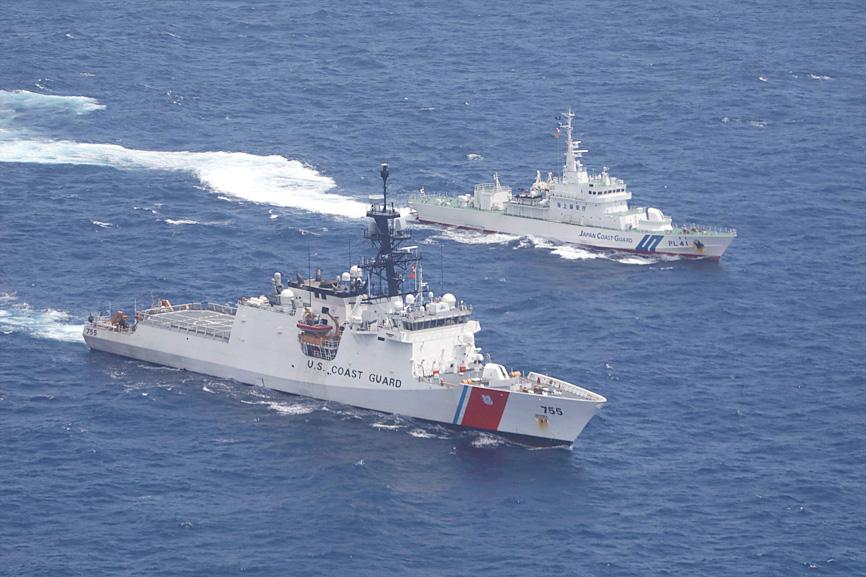A US warship and a US Coast Guard cutter on Friday sailed through the Taiwan Strait, making the eighth transit under the administration of US President Joe Biden since he took office in January.
The passage comes amid a spike in military activity by China, and follows Chinese assault drills last week, with warships and fighter jets exercising off Taiwan to the southwest and southeast.
The USS Kidd, an Arleigh Burke-class guided-missile destroyer, accompanied by the USCGC Munro, transited “through international waters in accordance with international law,” the US Navy said in a statement.

Photo: AP
“The ships’ lawful transit through the Taiwan Strait demonstrates the US commitment to a free and open Indo-Pacific. The United States military flies, sails and operates anywhere international law allows,” it said.
In Taipei, the Ministry of National Defense yesterday confirmed the transit of the two US ships through the Strait, one sailing south to north and the other north to south.
It monitored the transit via joint intelligence, surveillance and reconnaissance tools, the ministry said.
It also described the situation as “normal.”
China yesterday called the move “provocative,” saying that the Chinese People’s Liberation Army Eastern Theater Command organized troops to follow, monitor and guard the course of the US ships’ operations.
Taiwan and the US in March signed an agreement establishing a coast guard working group to coordinate policy, following China’s passing of a law that allows its coast guard to fire on foreign vessels.
Before Friday’s transit, the Arleigh Burke-class guided-missile destroyer USS Benfold sailed through the Strait on July 28.
Earlier this year, the USS John S. McCain sailed through the waters on Feb. 4 and April 7, the USS Curtis Wilbur on Feb. 24, May 18 and June 22, and the USS John Finn on March 10.
Friday was not the first time a US Coast Guard cutter has sailed through the Strait, but it was a reminder that the force is keeping vessels in the region and “engaging in more joint training and law enforcement diplomacy to help strengthen partner nation capacity vis-a-vis Chinese encroachments,” said Greg Poling, a maritime security expert at Washington’s Center for Strategic and International Studies.
Additional reporting by CNA

The Ministry of Foreign Affairs (MOFA) yesterday said it is closely monitoring developments in Venezuela, and would continue to cooperate with democratic allies and work together for regional and global security, stability, and prosperity. The remarks came after the US on Saturday launched a series of airstrikes in Venezuela and kidnapped Venezuelan President Nicolas Maduro, who was later flown to New York along with his wife. The pair face US charges related to drug trafficking and alleged cooperation with gangs designated as terrorist organizations. Maduro has denied the allegations. The ministry said that it is closely monitoring the political and economic situation

Conflict with Taiwan could leave China with “massive economic disruption, catastrophic military losses, significant social unrest, and devastating sanctions,” a US think tank said in a report released on Monday. The German Marshall Fund released a report titled If China Attacks Taiwan: The Consequences for China of “Minor Conflict” and “Major War” Scenarios. The report details the “massive” economic, military, social and international costs to China in the event of a minor conflict or major war with Taiwan, estimating that the Chinese People’s Liberation Army (PLA) could sustain losses of more than half of its active-duty ground forces, including 100,000 troops. Understanding Chinese

UNRELENTING: China attempted cyberattacks on Taiwan’s critical infrastructure 2.63 million times per day last year, up from 1.23 million in 2023, the NSB said China’s cyberarmy has long engaged in cyberattacks against Taiwan’s critical infrastructure, employing diverse and evolving tactics, the National Security Bureau (NSB) said yesterday, adding that cyberattacks on critical energy infrastructure last year increased 10-fold compared with the previous year. The NSB yesterday released a report titled Analysis on China’s Cyber Threats to Taiwan’s Critical Infrastructure in 2025, outlining the number of cyberattacks, major tactics and hacker groups. Taiwan’s national intelligence community identified a large number of cybersecurity incidents last year, the bureau said in a statement. China’s cyberarmy last year launched an average of 2.63 million intrusion attempts per day targeting Taiwan’s critical

‘SLICING METHOD’: In the event of a blockade, the China Coast Guard would intercept Taiwanese ships while its navy would seek to deter foreign intervention China’s military drills around Taiwan this week signaled potential strategies to cut the nation off from energy supplies and foreign military assistance, a US think tank report said. The Chinese People’s Liberation Army (PLA) conducted what it called “Justice Mission 2025” exercises from Monday to Tuesday in five maritime zones and airspace around Taiwan, calling them a warning to “Taiwanese independence” forces. In a report released on Wednesday, the Institute for the Study of War said the exercises effectively simulated blocking shipping routes to major port cities, including Kaohsiung, Keelung and Hualien. Taiwan would be highly vulnerable under such a blockade, because it